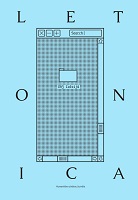Latvijas digitālo humanitāro zinātņu rīku un resursu izstrādāšanas prakses
Tools and Resource Development Practices in Latvian Digital Humanities
Author(s): Jānis Daugavietis, Agnese Karlsone, Ilona Kunda, Ance KristālaSubject(s): Information Architecture, Electronic information storage and retrieval, Social Informatics
Published by: Latvijas Universitātes Literatūras, folkloras un mākslas institūts
Keywords: Latvian DH field; DH tools and resources ecosystem; user experience research; interdisciplinarity; open science;
Summary/Abstract: The study was developed within the framework of a state-commissioned research project, the overarching goal of which is the development of digital humanities resources and tools (DH RR), as well as facilitation of the entire DH field in Latvia, which is a practically underexplored topic. As the object of research, we have chosen the practices of tool and resource developers, comparing them with the prevalent findings in theoretical literature and requirements of the current science policy. We use two main methods to obtain data – online survey of DH RR developers and maintainers, as well as expert interviews. Respondents were asked not only about their practices in developing and maintaining DH RR, but also surveyed to find out their ideas about what the ideal situation would be. The results of the study are in line with the conclusions made in the foreign academic literature on the main problems in the DH ecosystem. Firstly, it is a project funding system that has a particular impact on publicly funded research institutions. In project competitions, priority is given to innovation and the creation of new knowledge (new products or prototypes) over the long-term development and maintenance of existing resources. Secondly, the field of DH in Latvia is relatively new, so the structure and system of cooperation between the creators of DH tools and resources and the financiers of these activities (state scientific and cultural administration institutions) are only being formed. To a large extent, Latvian DH RR ecosystem, which in our research is mainly limited to state-subsidized national research and memory institutions, still functions on the basis of the initiative, needs, competence and available resources of the institutions themselves and their individual researchers.
Journal: Letonica
- Issue Year: 2022
- Issue No: 47
- Page Range: 12-51
- Page Count: 40
- Language: Latvian

